Christian Marriage is Beautiful…and Hard
By Robert Fontana
Christian marriage is beautiful, wonderful, amazing, and awesome because marriage, when done right, brings about what St. Paul calls the fruits of the Spirit: love, joy, peace, patience, kindness, goodness, faithfulness, gentleness, and self-control. (Gal 5:22-23) And this is true, of course, for secular marriages as well. I have a bias towards marriage as a Catholic who accepts the Catholic worldview on marriage: a life-long covenant, freely entered, that welcomes children.
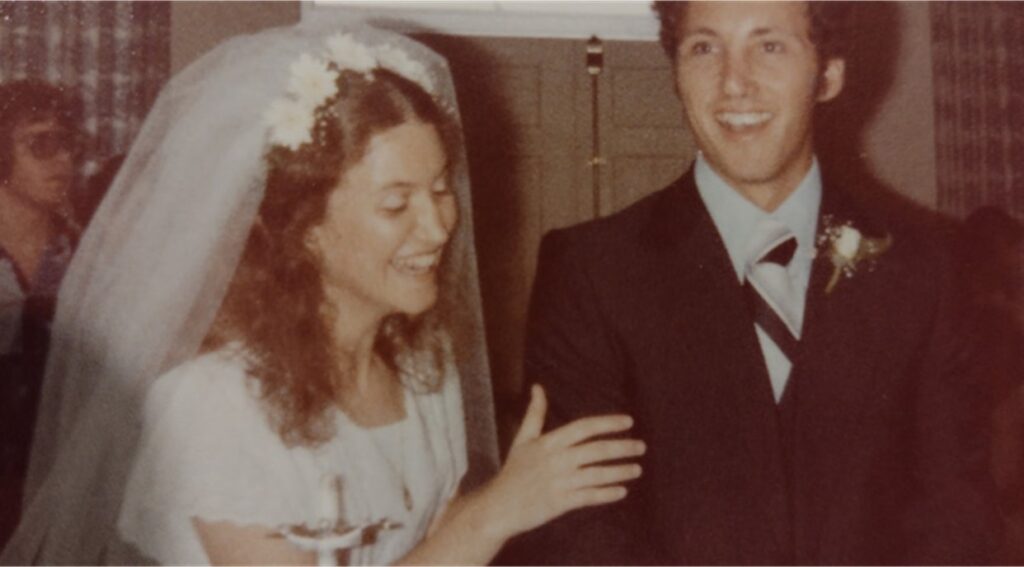
But the social research supports what Catholics and other people of faith believe about marriage. Basically, IT’S A GREAT INSTITUTION that needs to be valued, protected, and supported because successful marriages contribute so much good to society. In her book The Case for Marriage (© 2000), University of Chicago sociologist Linda Waite and co-author Maggie Gallagher document evidence from social research around the country regarding the state of marriage in America. What they discovered was that people who are married are happier, wealthier, healthier, have children who are more likely to succeed, and have better sex lives than their fellow American who were co-habiting or single (never married, divorced, or widowed). Yes, contrary to the jokes and the Hollywood image of swinging singles, married people report sex lives which have almost the same frequency as their co-habiting counterparts, more frequency than their single counterparts, and more enjoyable and meaningful than both groups!
Some might say, well Rob, that research is old. Maybe things have changed. We increasingly live in a post-marriage culture. Young people are moving in together and remaining unmarried in greater numbers. They are not having children; instead they get dogs. What does the research say about marriage in the post-pandemic America of today?

Good question. Because Brad Wilcox, professor of sociology and director of the National Marriage Project at the University of Virginia, has completed research on the state of marriage in America… and guess what he found out? The conclusions that Waite and Gallagher wrote in 2000 hold up today in 2024. Wilcox concludes in his book, Get Married, that Americans must, in fact, “save civilization” by embracing marriage and forging strong families!
THERE ARE NO LOSERS WHEN MARRIAGE SUCCEEDS! Everybody wins! In fact, contrary to popular myth, the biggest winners in successful marriages are MEN!! Marriage isn’t a ball and chain holding men down. Marriage is what most men need to mature and become their best selves.
Certainly, women and children thrive when marriage succeeds, but the evidence shows that men especially do. Married men enjoy more physical and mental health, live longer, and report happier and more meaningful lives than their single male counterparts. Single men, as they age, suffer more episodes of depression, struggle with isolation, turn more often to alcohol, drugs, porn, and watching sports to cope, and die younger than their married counterparts.
Christian marriage adds a special purpose to marriage that both enriches married love and spreads its goodness. Christian marriage is all about Jesus and his mission on earth, to announce the good news of the Kingdom of God. Jesus described the Kingdom of God as a “treasure” discovered in a field and a “pearl of great price” for which one is to sell everything to purchase. (Mt 13:44-46)
The “Kingdom of God” is nothing less than the Holy Spirit fully alive and active in creation: working for love to overcome hate, hope to conquer despair, and faith to be victorious over sin and suffering. The Kingdom of God is vast and present in creation and among all people who sincerely seek God and strive to be guided by love. It is most visible in the life, death, and resurrection of Jesus.
Jesus proclaimed the Kingdom of God not simply to get you and me to heaven but to bring heaven to earth. Indeed, he taught us to pray that “thy kingdom come; thy will be done on earth as it is in heaven.”
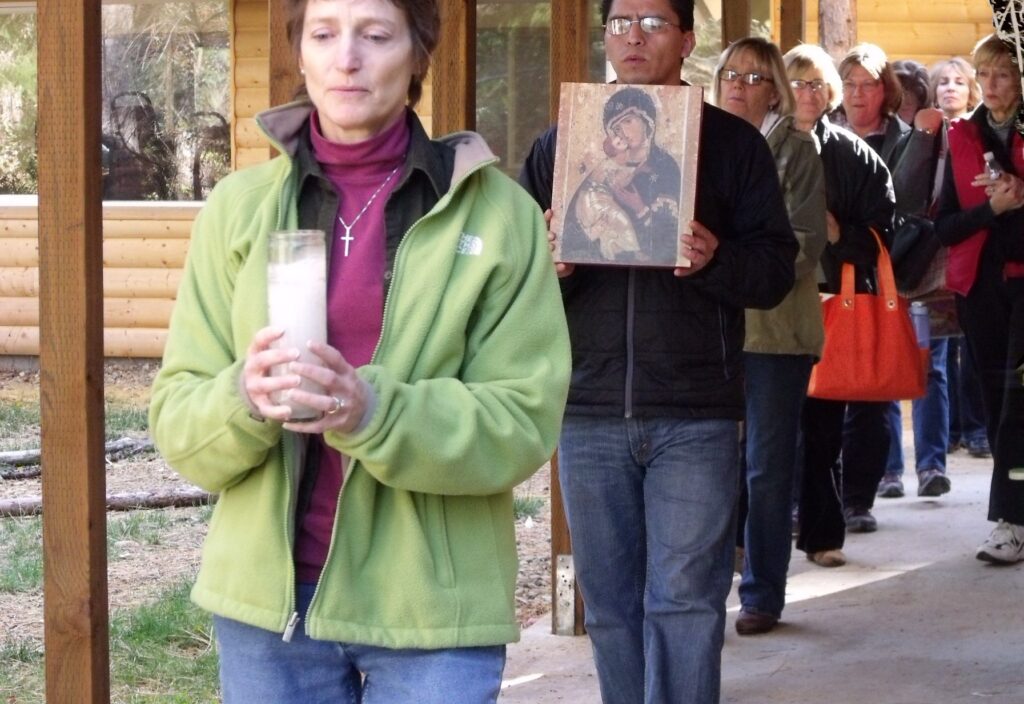
Christian marriage, as a sacrament of the Church, is a building block for the Kingdom of God on earth. It is a visible and tangible institution that God uses to build strong individuals, families, neighborhoods, schools — the foundation for a good and just society. It is a visible sign of God’s love for humanity and all creation (Ephesians 5:21-33). This doesn’t mean that Christian marriages are problem-free. In fact, Christian marriages have all the problems that every marriage has when two people who are very different from one another try to love one another and their children within the challenges and complexities of everyday life. And it is in the very process of spouses’ working at loving and forgiving one another as disciples of Jesus that God’s kingdom unfolds. It is truly a “treasure hidden in a field.” This is how Lori describes it:
I’m convinced that my marriage, too, is that hidden treasure alluded to in Scripture. My marriage in Christ, a sacrament of life and love, is worth whatever sacrifice is necessary to make it work. It takes all the faith, hope, and love that Jesus has given me to love and serve my spouse and family. Marriage comes at a great cost – EVERYTHING! The happily-ever-after scenario from the fairy tales is just that; a fairy tale, unless both spouses are willing to risk everything – their egos, independence, self-centeredness, personal hopes and dreams, etc. – to become one in Christ. Thankfully, we have a lifetime to do this because it does take a lifetime for couples to love one another, grow in friendship and trust, work together as a team especially as parents, and forgive one another.
Marriage is the hidden treasure. It demands of us every ounce of energy, every skill at communicating, and every reserve within our hearts to live up to the promise we made in our marriage vows: “to love, to be true, and to honor.”
What is the “hidden treasure” that could be worth such a sacrificial way of life? Peace! In John’s Gospel (14:27, 16:33) we read, “Peace I leave with you; my peace I give to you. Not as the world gives do I give it to you…I have told you this that you might have peace in me…”
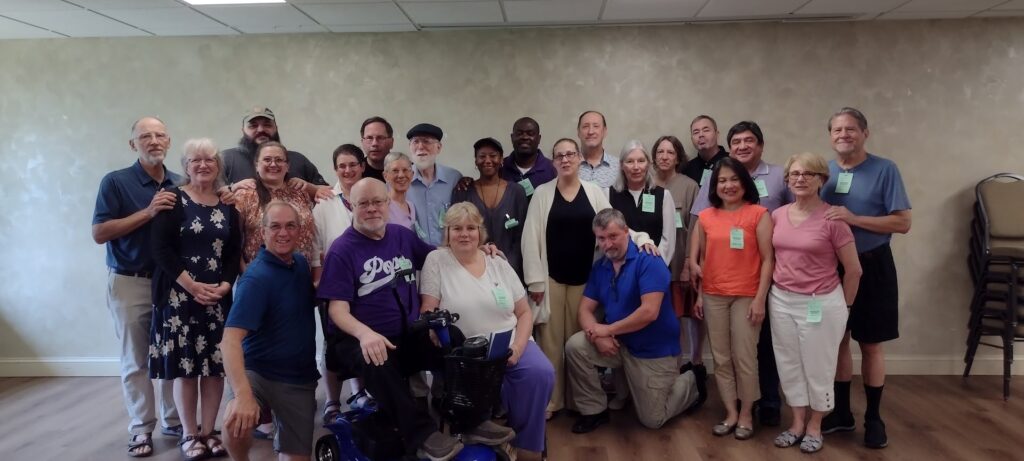
Christian marriage is beautiful. When done right, when we create a pattern of working together as Lori described above, we gain a taste of heaven as described by Paul. We gain the fruits of the Spirit: love, joy, peace, patience, kindness, goodness, faithfulness, gentleness and self-control. (Gal 5:22-23)
(Next article, Christian Marriage is Beautiful…and Hard, Part II.)
1933 Nazi Germany, the National German Church and 2024 USA, Christian Nationalism
by Robert Fontana
Something terrible happened in 1933 Germany. The previous year the Nazi party won enough local elections to become one of the dominant political parties in Germany, with enough political clout to warrant the naming of Adolph Hitler as chancellor of Germany. Hindenburg, the German president, did not want to name Hitler chancellor. He feared Hitler’s aggressive and intimidating tactics. But the old president was persuaded by advisors that Hitler would be restrained by wise counselors. They were wrong. Hitler was not to be restrained. He quickly seized power and made Germany a one-party state.
As terrible as that was, that is not the event I am referring to. No, the event I am referring to is the absorption of 28 regional Protestant Churches into the National Reich Church which fully supported the Nazis and their policies. Pro-Nazi German Christians wanted a “nazified version of Christianity.” Their leader, Ludwig Müller, was a rabid Nazi and antisemite who was named the first bishop of the National German Church. [1]
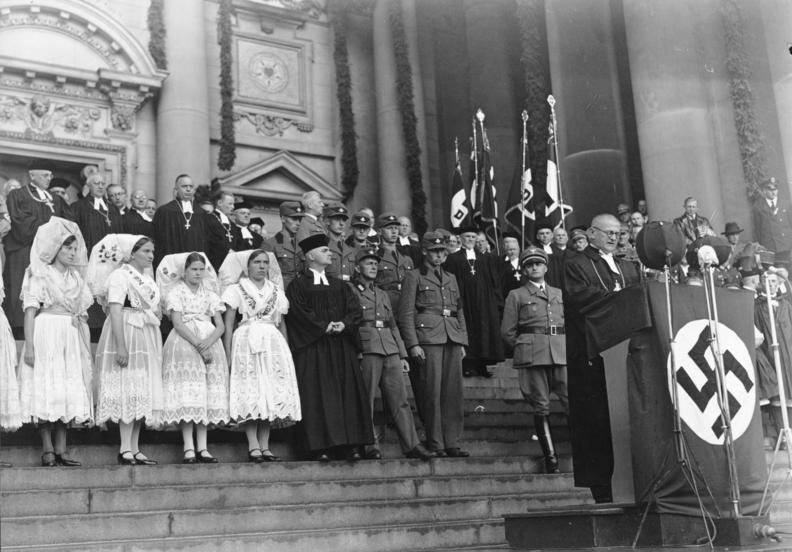
Initially the only Christian group who opposed the Nazis and the German National Church were evangelical Lutherans led by Martin Niemöller and Dietrich Bonhoeffer. Niemöller and Bonhoeffer demanded that the church of Christ centered on the Word of God not be co-opted and replaced by the state. This was idolatry of the worst kind. They formed the Confessing Church in opposition to the Protestant National German Church and the Nazi regime, knowing full well of the opposition to come.[2]
The Vatican initially tried to work with the Hitler regime. On July 20, 1933, the Vatican signed an agreement with the German foreign minister which recognized Hitler’s role as chancellor, giving him international legitimacy. With this agreement the Vatican withdrew support for the Catholic political party that had been challenging the National Socialists/Nazis. In return, the Nazi government gave the Catholic Church freedom without government interference to exercise its mission of churches and schools in Germany. This, of course, was a commitment that Hitler did not keep. As Hitler increased the use of violence against his political enemies and enacted antisemitic laws and harassment of Jews, he also pressured Catholic leaders to remain silent.[3]
The Pope refused to be silent. On March 10, 1937, Pope Pius XI issued an encyclical (Mit brennender Sorge/With Deep Anxiety) condemning the Nazi regime’s violation of the 1933 agreement and the neopaganism and worship of the state that had replaced true religion in Germany. Pius defended the dignity of the human person which must be protected by the state: “man as a person possesses rights he holds from God, and which any collectivity must protect against denial, suppression or neglect.” Pius did not explicitly name Hitler and the Nazi regime his encyclical, but he did make a reference to a “mad prophet” leading the people. Mit brennender Sorge was written in German and not Latin. Fearing Nazi censorship, the Vatican smuggled 300,000 copies into Germany. The encyclical was read from the pulpit of every Catholic church on Palm Sunday, March 21, 1937. Hitler was outraged. The next day the Gestapo, the German secret police, raided Catholic churches across Germany to confiscate copies.[4]
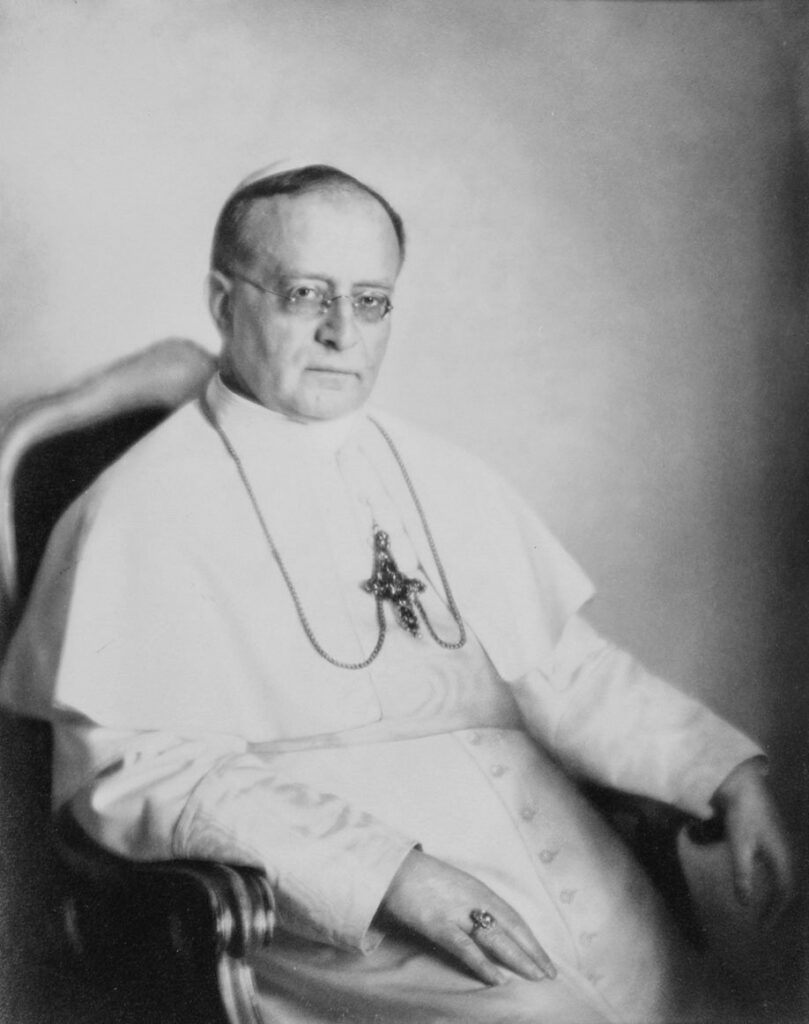
As Germany edged closer to war in Europe, all opposition to the Nazis, both Protestant and Catholic, was crushed. The Confessing Church was closed, its seminarians conscripted into the army, and its leaders arrested. Catholic schools and religious institutions were closed, and Catholic leaders, clergy and lay, who spoke out against the Nazis were also arrested.
I see disturbing similarities between the Germany of the 1930’s and the United States in 2024. There is a new fascism in the US led by the former president that has broad support from evangelical Christians. Much like German evangelicals who supported Hitler without question, Christian nationalist support Donald Trump without question. They see Donald Trump as God’s instrument to return the U.S. to its Christian foundation and conservative values.[5]

Christian Nationalists are supporting Trump despite the following:
- Trump has refused to accept the results of the 2020 election and has repeatedly lied to the American public that the election was fraudulent and stolen (even though Trump’s own attorney general told Trump the election was free from fraud.
- Trump was willing to use violence to overturn the 2020 election. He invited supporters, including violent extremists like the Proud Boys and Oath Keepers, to assemble at the Capitol on January 6 and pressure the Republican congressional delegates and Vice-President Pence to reject the results of the electoral college. (JD Vance stated that had he been Pence, he would have rejected the certification of the electoral college vote giving Biden the win in the 2020 election.)[6]
- The Justice Department indicted former President Trump on four felony counts for his efforts to overturn the 2020 presidential election.[7]
- A Fulton County, Georgia, grand jury indicted former President Trump and 18 others including his chief of staff Mark Meadows for unlawful efforts to change the outcome of the 2020 election in that state.[8]
- A Manhattan federal jury found former President Trump guilty of sexually assaulting E. Jean Carroll in a dressing room in a luxury department store.[9]
- Another Manhattan federal jury found the former president guilty of 34 counts of falsifying business records. This trial featured hush money Trump paid to a porn star, Stormy Daniels, to keep her from going public about their sexual encounter before the 2016 election.
Christian Nationalists proudly proclaim, “Jesus is my savior, Trump is my president.” They see Trump as God’s instrument to “Make America Godly Again.” They pay little attention to Trump’s lies or immoral and criminal behavior. They support Trump right or wrong and will use violence if necessary to reach their goals.[10]
One thing that was present in 1937 but is missing in 2024 is the voice of Catholic leaders publicly naming the lies and threats of the new fascism and condemning them.
- Where is the Catholic bishop who will declare that sexually assaulting women, lying to the nation, and undermining trust in the democratic process and in the judicial system is a grave sin?
- Where is the Catholic bishop who will declare that attempting to overturn a duly elected president by violence and deceit is a mortal sin?
- Where is the Catholic bishop who has the wisdom and courage of Pope Pius XI to write a pastoral letter to the people of his diocese, to be read at all the Masses, naming the lies and threats of the new fascism and condemning them?
This is not taking a partisan position, Democrats over Republicans. This is about spiritual discernment and reading the “signs of the times” of the very real threat that the Christian Nationalists and former president Donald Trump pose to the constitutional government in United States in 2024.
Having the Pope speak out did not stop the Nazis in 1937, but it was the right thing to do. Having the bishops speak out against the current rise of fascism promoted by the former president and his followers may not stop them either, but it is the right thing to do!
[1] https://encyclopedia.ushmm.org/content/en/article/the-german-churches-and-the-nazi-state
[2] Ibid
[3] www.americanmagazine.org/faith/2003/09/01vatican-concordat-hitlers-reich
[4] https://en.m.wikipedia.org/wiki/Mi_brennender_Sorge
[5] Freedomforum.org
[6] https://www.npr.org/2022/12/23/1145209559/jan-6-committee-final-report#:~:text=After%20roughly%2018%20months%20of%20investigations%2C%20the%20House,Donald%20Trump%20for%20his%20role%20in%20the%20attack.
[7] https://www.pbs.org/newshour/politics/read-full-the-indictment-against-trump-for-his-efforts-to-overturn-the-2020-election
[8] https://www.pbs.org/newshour/politics/read-the-full-georgia-indictment-against-trump-and-18-allies
[9] https://www.cnn.com/politics/live-news/e-jean-carroll-trump-trial-verdict-05-09-23/index.html
[10] https://apnews.com/article/trump-christian-evangelicals-conservatives-2024-election-43f25118c133170c77786daf316821c3
Homespun Homily by Lori: A Day at the Shelter
Sunrise is about 5:45 these days. I know because the curtain on my east facing window hangs about three inches above the bottom of the window. The morning sky is beautiful, heralding another HOT desert day.
Morning duties begin by 6:30. Unlock the many doors of the house. Fill the giant cooler with ice and water. Turn off night lights, empty garbage cans, restock the bathrooms with TP and clean hand towels. And perhaps most important, brew the morning coffee.
The “casa” is quiet at this early hour except for the chorus of birds singing in the patio. In the background are the sounds of whirring and voices and traffic from the construction site next door. On most days this is the calm before the “storm.”
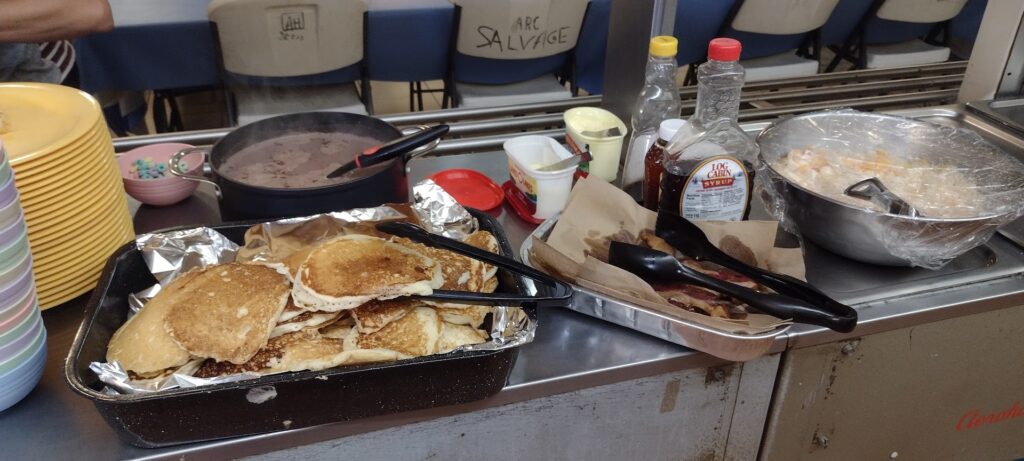
Before the 8:15 breakfast, the church bells peal, announcing the daily 8:00 Mass at the church next door. Then there is the laughter and padding of little feet, the toys banging and the occasional cries over sharing a toy among the several young children staying here. Very slowly, adults appear in the hallways, tired eyes and tousled hair. All of us wish for a little more sleep.
Each day is structured around meals and chores, and appointments for health issues, school registration, and immigration paperwork. There is family to contact, travel arrangements to make. At 10 every morning there is a YouTube English lesson for young and older to learn the English alphabet and vocabulary for time, money, days of the week, body parts, verbs. English is a difficult language –because there are rules…and, oh, by the way, there are all those exceptions to each rule.
As much as we plan out each day, there are always surprises. In our six weeks here, there have been “field trips” to the nearby shopping center and a water spray park. There have been medical emergencies, clinic and dental visits, a brand-new baby, and many last-minute grocery runs for cooking oil, avocados, pinto beans, or ice cream. There have been the everyday ailments of scrapes and coughs, headaches and mosquito bites. And we’ve enjoyed the fun of Bingo, a pizza party, a sidewalk chalk art show, a dance, and bi-lingual karaoke on the patio.
There have been many trips to the airport and a couple of walks with guests to the bus station in the middle of the night, though we really discourage those late-night, early-morning departure times. Many of our guests have never traveled by bus or plane. They are anxious because they don’t know what to do on a plane or bus, nor do they completely understand where they are going.
However, there is a wonderful network of people here to help, providing duffle bags and backpacks and food for the journey, and there is even a group of people who greet the departing migrants at the El Paso airport and accompany them through security and all the way to the door of their airplane.
There are planned weekly events to look forward to: a community member comes once a week to help in the kitchen and prepare a delicious meal. Fr Iggy, a Franciscan friar, celebrates Mass with us in our lovely chapel every Wednesday and usually stays for lunch to visit and share his joy and compassion. Sister Guadalupe leads a prayer group twice a week for whomever wants to attend. Participants sing and pray, reflect and share stories of their lives and their faith. Sister concludes her visit with a sweet treat for everyone and a raffle drawing for a prize for one lucky winner. (Robert and Lori pictured below with Sr. Deidra, an immigration lawyer.)
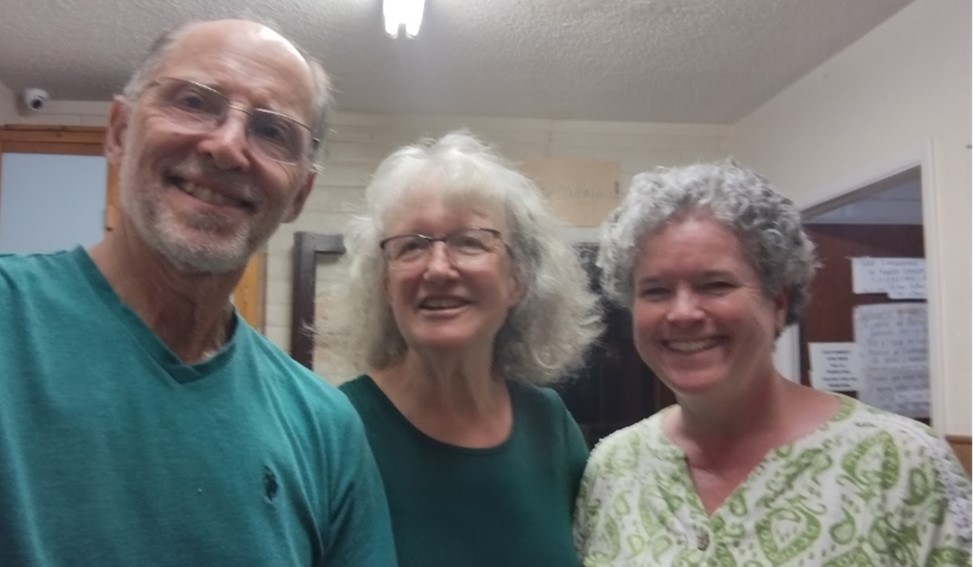
We’ve had ice cream cones and water balloon tosses, cooling off in the sprinkler and watching fireworks in the neighborhood for the 4th of July. We rounded up lots of coloring books and washable markers for our budding artists PLUS there is an artistic community member who has helped the children (and some of the adults) paint pictures and decorate rocks and mold playdough into imaginative sculptures. We even got some novels in Spanish to make a little library for the teens and adults. And every night after supper, there is a popular movie in the “sala” (community room), dubbed in Spanish.
Life in the shelter, Casa Papa Francisco, is mostly the normal day-to-day life. But there are also the hopes and dreams, the fears and anxieties of our guests, who are desperate for a better life for themselves and their children. In this country, all of us, except for the Native American peoples, have in our family tree ancestors who journeyed to here with these same yearnings, the same hopes for safety, enough food, and the dignity of work with just pay. Can we extend welcome to this new generation of migrants?
20 years ago I was attacked by a woman with an ice pick (And your invitation to support Catholic Life Ministries!)
By Robert Fontana

There is a saying that “Fools rush in where angels fear to tread.” Lori often quotes that verse to me when I make a suggestion to her like, “Why don’t we go to El Paso and work in the shelter for the summer?” But I digress from the story about being attacked by a woman with an icepick. It’s true.
I was working at the Diocese of Yakima late one fall evening. The sun was beginning to set, I was alone at the office when the phone rang. I answered it, and the woman on the line pleaded desperately for help: “I NEED A PRIEST! I NEED SOMEBODY TO HELP! MY DAUGHTER IS POSSESSED!” I could hear the daughter screaming in the background. Her mother continued, “Can you help? Please! She says she’s in hell. She’s been listening to heavy metal music all day. I don’ know what to do!” I asked the woman if her daughter had been drinking or doing drugs. “Absolutely not!” (Of course, that wasn’t true. She had been drinking heavily.)
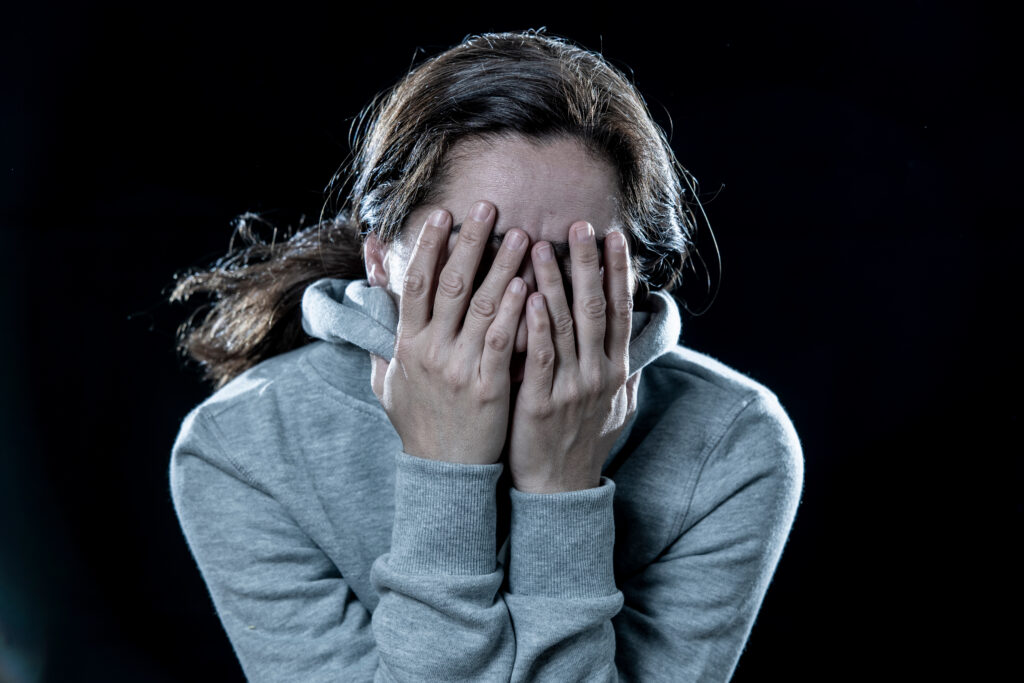
I took her address and phone number and vowed to get help. I called a local priest and asked for his assistance. “I WOULDN’T TOUCH THAT WITH A 10-FOOT POLE. CALL MENTAL HEALTH.” I was a little offended by the priest’s response. When someone calls the Church for help, the Church ought to be there for them even though other professionals need to get involved as well. I called the mental health hotline and the dispatcher said he would organize a team to go to the woman’s house, but it would take “an hour or so.” I decided I would go ahead of them and help comfort the mother.
What unfolded can only be described as a scene out of an Alfred Hitchcock movie. The woman and daughter lived in a rural section of Yakima County, at the end of a long gravel road. I stepped out of the car. I kid you not, the wind was blowing, her screen door was slamming open and shut, and a dog howled in the distance. I had the thought, “I might be killed. Maybe this isn’t a good idea.”
I knocked on the door, and the panicked mother let me in, so grateful that I would come to help. “Okay, maybe I won’t die.” She described the events leading up to her daughter current state and led me to the young woman’s room. We entered, and I saw a terrified 17-year-old sitting curled up on her bed with her back against the wall. She was holding a large plastic container of something I assumed was soda.
As I approached her, I had the strong notion to sing Amazing Grace. I was hoping it would be familiar, show to her I was not a threat, and help her to calm down. Her mother was right behind me. I was able to get right up to her when suddenly she leaped at me, brandishing an ice pick in her hand. She slashed and nicked my back. Soda splashed all over me and her and her mom as Mom and I tried frantically to grab the ice pick from her. When I pulled the ice pick away, the girl retreated to her bed, and Mom and I fled to the kitchen.
I called the Mental Health Hotline. “What’s taking you so long?” “We’re on our way.” I told them about the ice pick. The dispatcher said, “Oh, I forgot to tell you to remove all dangerous objects from her room!”
The mental health crisis team eventually arrived, and I handed off the mother and daughter to the professionals. Mom was eternally grateful that I came to her house. It truly helped her calm down. And I learned a valuable lesson. Do not try to do good beyond my expertise. Comforting the mother? I knew what I was doing. Helping the girl? I was out of my league.
Now what does this story have to do with my asking you to pray for and donate to Catholic Life Ministries? We do work that you believe in and can’t do yourself – marriage enrichment and preparation; spiritual development; service days for the elderly and poor; mental health counseling for individuals, couples, and families. We reach out, take risks, learn from our mistakes and strive on to awaken young and old alike to the great love God has for us in Jesus and the Holy Spirit. It doesn’t stop there, we challenge ourselves and those we serve to return God’s love by loving one another, especially those on the margins, the poor and spiritually abandoned.

We also write about the graces and challenges of living as disciples of Jesus within the contemporary world. We do so, not as experts, but as sinners struggling to be saints within the circumstances and events of our daily life. We are not above criticisms and disagreements, and we welcome both, along with your suggestions/comments.
If you are already a sponsor of CLM, we thank you with grateful hearts, and ask you to renew your commitment. If you are not a sponsor of CLM, we ask you to consider becoming one. Our commitment to you is to do effective ministry and to address difficult topics of integrating faith with life. We aim to “think with the Church,” as one spiritual mentor said, and we add, “and help the Church think!”
To Donate to online go to: https://www.catholiclifeministries.org/donate/
To donate by US Post:
Make checks payable to CLM. Mail to:
Catholic Life Ministries, 1827 NE 58th St. #B, Seattle WA 98105

Homespun Homily: Notes from the Border
By Lori Fontana
How bad would it have to be that you would choose to leave your home, your extended family and friends, your country, and perhaps even your children or spouse to travel to a place where you desperately hoped life would be better? How bad?
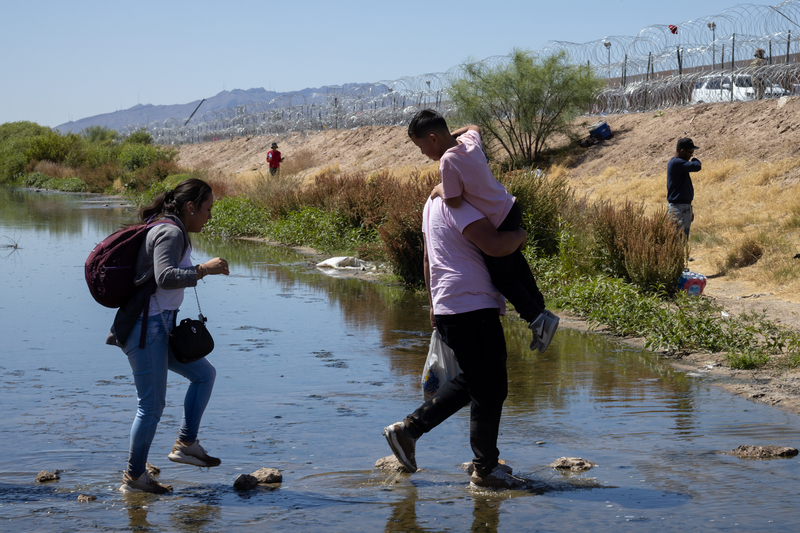
How bad would it have to get for you to choose to travel thousands of miles – not via plane, train, or bus, but crammed in an open train car, or locked in the windowless trailer of a semi, or walking through thick jungle teeming with poisonous snakes and insects, through hostile cities plagued by corrupt police officials, through barren desert, with no relief from the heat, the tiredness, the hunger and thirst?
These are the “travel” stories we’re hearing here at the border. The people we meet are beautiful and brave. They arrive at our shelter having endured trauma, first in their own communities which are unstable, at times to the point of collapse, under the weight of high inflation, few jobs, and high- priced and / or scarce food and necessities.
Many have endured physical deprivation and abuse on their journey. They’ve paid their life savings to hire a “coyote” who promises safe passage, but instead they have been mistreated with verbal and physical violence or even left stranded along the way, without food or water.
Some of our migrant guests have been the target of gang violence. They’ve been threatened, extorted, beaten, stabbed. One person who wouldn’t cooperate with the local gang was thrown into a pond of crocodiles. Gang members have threatened to kidnap or kill their children and other family members.

As I see it, and as our guests tell of their own experiences, it becomes apparent that people migrate to our United States of America for two basic reasons: lack of food / work and threat of violence. And I very much believe that if faced with either of these scenarios, I, too, might risk everything to end up in a place where I could find a job and have enough to eat, where I could send my kids to school and to bed each night without worrying that they might be kidnapped or killed.
Our borders, immigration – it is all very complicated; and yet, it’s simple. Native Americans were the first inhabitants of this land from sea to shining sea. And all of the rest of us are immigrants or come from a line of migrants to this country. Being a U.S. citizen is not the result of anything we’ve done – we were just born here! Many don’t see it this way. Loud voices decry migrants of today – they’re taking our jobs, crowding our schools, packing welfare rolls.
But, please, open your eyes. Look around. On an ordinary day in my hometown, someone delivered my newspaper (I still read one!) to my doorstep; someone cut my hair – both recent migrants. I rode the city bus – the driver was from west Africa; I ate some Thai food – the chefs were from Thailand. I passed a shoeshine stand, a laundromat, a nail salon – each of the proprietors was a recent immigrant. Our doctor is from China and our dentist from Korea.
How many “Help Wanted” signs do you see each day? Restaurants, hospitals, construction companies, schools, tech companies, daycares, retail stores, parks departments, farms and grocery stores – all segments of our economy are begging for workers. Where will they come from?
In 1886, in New York Harbor, the Statue of Liberty was dedicated. Did you learn Lady Liberty’s inscription as a school kid?
Give me your tired, your poor, your huddled masses yearning to breathe free, The wretched refuse of your teeming shore, send these the homeless tempest-tossed to me. I lift my lamp beside the golden door! ~Emma Lazarus

In the 1880’s, the tired and poor coming to our “golden door” were O’Malleys and Salvatores, Bukowskis and Ovrelids (like my grampa from Norway), Schmidts and the English counterpart – Smiths. Today it’s Sanchezes and Aguileras, Fouches and Bekeles, Smirnovs and Wangs. People yearning for, and willing to work for, an opportunity at the “American Dream.”
If the Statue of Liberty doesn’t compel you to reflect on immigration in 2024, I hope you will turn to the words of Jesus:
“For I was hungry and you gave me something to eat, I was thirsty and you gave me something to drink, I was a stranger and you invited me in, I needed clothes and you clothed me, I was sick and you looked after me, I was in prison and you came to visit me.” Matthew 25:35 – 36
It is clear that our immigration system needs work. In the meanwhile, as Christians we are challenged that migrants are “Jesus” at our door. What part am I called to do? I can’t fix the global problems. But I can welcome the stranger at my door and offer a cup of cold water. This is the mission of Annunciation House.
El Paso Journey from Seattle Vs El Paso Journey from Ecuador
By Lori and Robert Fontana
The day before we left Seattle I took a walk through my favorite green space, the Ravenna Ravine. I walked slowly, knowing that Lori and I were going to be living in El Paso, a city in the high desert, close to our southern border which is crowded with buildings and has very few trees. I breathed in the cool air, listened to the wind and the birds, and savored the moment.

We then said our goodbyes to our children and grands, finished packing our car, and left early on the morning of May 29 for our four-day “grueling” drive to El Paso. First stop was Spokane, Washington, to see good friends Mike and Mary who served us a delicious homemade soup for lunch. We continued to Missoula, Montana, to spend the night with George and Mary. We laughed with their son Liam, engaged in world-saving conversations, enjoyed delicious home cooking and a good night’s sleep.
Then it was off to El Paso, driving through southern Montana and Idaho listening to upbeat tunes from “The Chicks,” Abba, the Beatles and praying with Michael W. Smith, Taize, and the Brooklyn Tabernacle Choir. We drove over the Continental Divide twice and saw magnificent scenery in the Rocky Mountains. We hit traffic passing through Salt Lake City just when we were feeling exhausted from driving. AGH!! Spent the night in Provo at a quaint Airbnb and then off again for another ten-hour day of driving (we had a few old bladder pit-stops), an overnight in Albuquerque, and then our final day, a short five hours to El Paso.
Of course, along the way, we had all the coffee, cold water, snacks – kettle-corn for when we were drowsy – and food necessary. We arrived in El Paso late Saturday afternoon and were welcomed with open arms by Ruben Garcia (director of Annunciation House), and other volunteers.
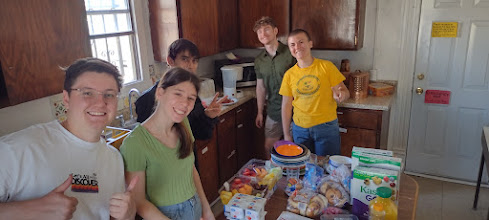
On Sunday we were given a short orientation as to what to expect at the A-House shelters and our forthcoming jobs. Then we were given the rest of the day off to recover from our travels. Whew, we needed that rest. Work began on Sunday.
In contrast, some of the guests we received just this week had very different travel experiences. They did not simply “leave” their homes, friends, and family members, they fled! They fled from Bolivia, and Ecuador, Mexico and Venezuela. Ruben asked us, “Why would a person flee one’s homeland?” He provided the answer: “Fear and Food.” Fear of the local criminal organizations and gangs threatening them with violence, kidnapping their children, and extorting them for money to leave them alone. They also leave because of the poverty they experience and the inability to work and properly feed their children.
The guests who arrived this week came from Ecuador, Venezuela, Bolivia, Mexico, and Guatemala. They arrived here via a combination of flying from their country to another one, e.g. Ecuador to El Salvador, and then boarding a crowded bus to Guatemala. Some must walk through Guatemala; others may take a bus or hire a driver to get to Mexico. Once in Mexico they still have 2,100 miles to travel to get to Juarez which is the sister city to El Paso. Several traveled through the treacherous Darien Gap – dense jungle that connects Colombia and Panama.
Once in Mexico they make their way north, walking, traveling in an open train car packed with dozens of other migrants, and some even in a freight container being pulled by an 18-wheeler truck. By this time, our guests who are traveling with children have little money, food, or water. They are in hot, cramped quarters. One woman told me that it was so hot in the container in which they were placed, that an older person died from the heat. She told me that the entire trip was very scary, especially for her baby with severe medical challenges.
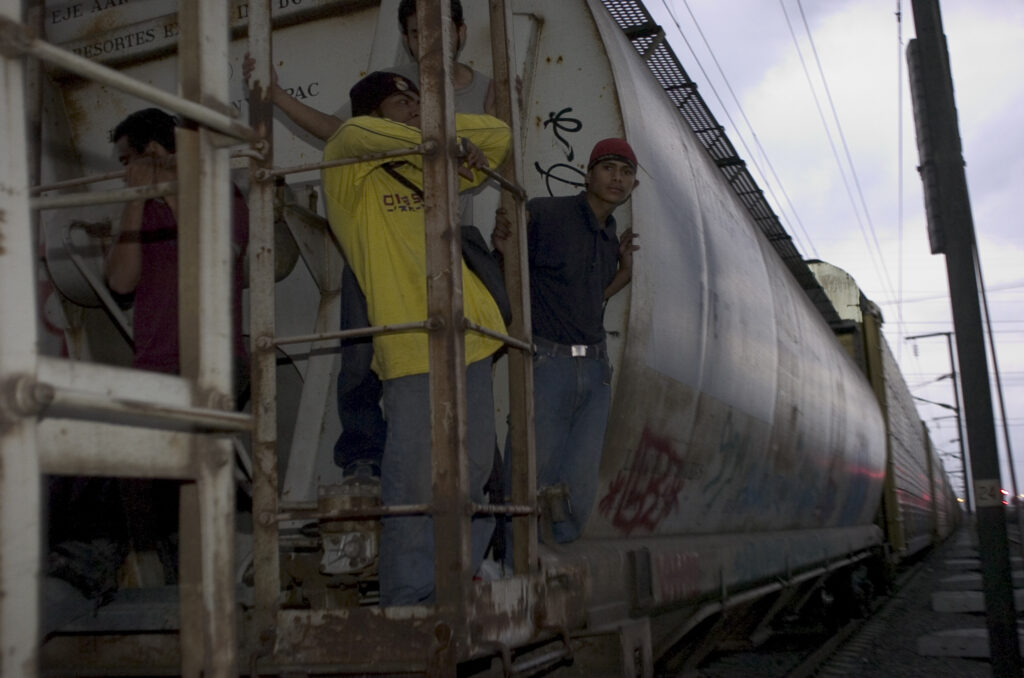
All of our guests reached the US – Mexico border at Ciudad Juarez. Some spent many days at a shelter in Juarez before presenting themselves at the border to US border patrol asking for asylum which is provided for by US law. Officers take the migrants into custody and do an initial interview to determine if they have a valid reason to seek asylum. If they do, they are given paperwork that gives them legal status for being in the United States.
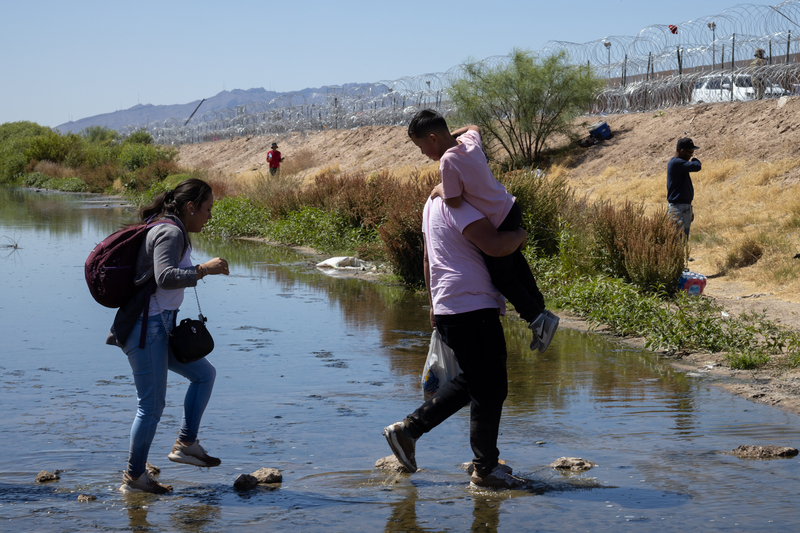
THIS IS IMPORTANT: MIGRANTS WHO HAVE ASKED FOR ASYLUM AND HAVE BEEN GRANTED PERMISSION TO BE IN THE US AND HAVE TO REPORT AT A FUTURE DATE BEFORE AN IMMIGRATION JUDGE TO REVIEW THEIR CLAIM FOR ASYLUM, ARE HERE LEGALLY. THEY ARE NOT “ILLEGAL ALIENS.”
Migrants who need assistance to get wherever they want to go in the US are brought to one of the Annunciation House shelter sites in El Paso by US immigration officers. This is not the end of their journey. Here we welcome them, give them cold water, coffee, and food and assist them in contacting their family members and friends in the States who are expected to purchase a ticket for bus, plane or train to get them to their final destinations. Most guests speak Spanish and very little English. Some speak a little Spanish because their primary language is an indigenous one. If necessary, they are welcome to sleep at the shelter until their travel arrangements are completed.
There are occasions when some migrants were injured in their crossing and need long-term medical care. These people stay at the house in which we are working, Casa Vides.
The guests we have received are all extremely grateful to be welcomed and assisted. The most moving time for us has been when they share their difficult journeys with us, and then when we join hands in prayer to bless them as they leave. Their journey has not ended until they have landed in Oakland, Nashville, Tallahassee, Arlington, etc. and are received into the arms of their loved ones.
Why do Ruben Garcia and the hundreds of volunteers who come here year after year do this work of hospitality? It is simple. They (and we) are guided by the words of Jesus who said that when we feed the hungry, welcome the stranger, clothe the naked, etc. we feed, welcome and clothe Jesus himself. (Matthew 25: 31-46).
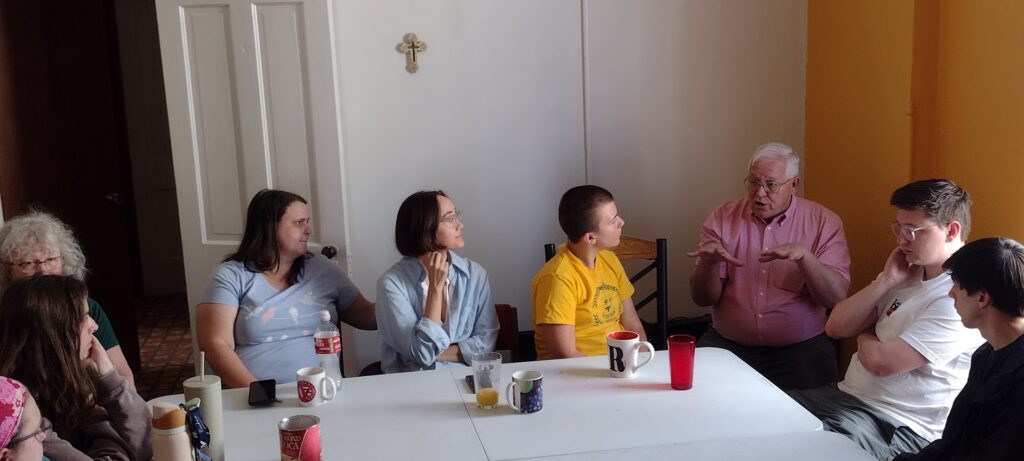
As we reflect on the many journeys that have brought each of us to Casa Vides in El Paso, we’re humbled. There is no comparison, really. We were traveling / journeying as a choice. We had resources: a car, food, money to buy whatever we needed; we knew exactly where we were headed and exactly how much time it would take us. Our migrant sisters and brothers have none of this certainty or security. They set out on a journey in desperation, and they hope they will survive. Our country’s immigration policies need great reform. But meanwhile, we also need those who will welcome the stranger at our door as Jesus commands.
We’re volunteering at Annunciation House this Summer!
By Robert Fontana
What’s Annunciation House or A-House and why are we volunteering there in El Paso, Texas, for the summer at the hottest time of the year?
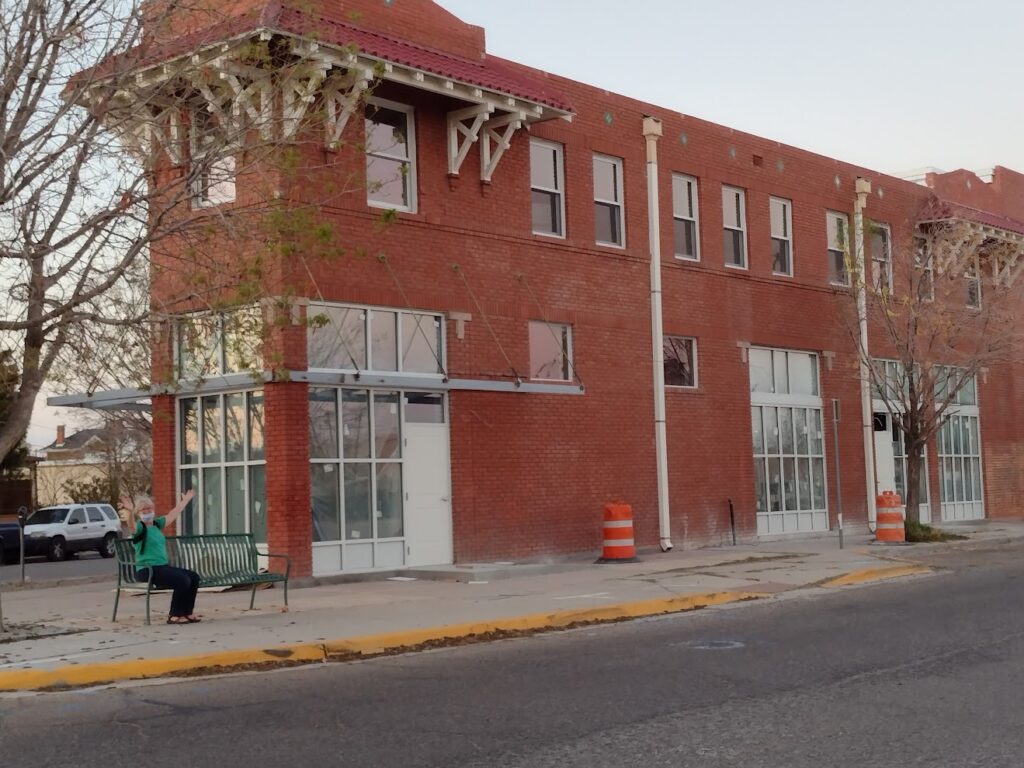
In the winter of 1976, a small group of young adults first gathered to consider and discuss the possibility of undertaking a journey that would one day be known as Annunciation House. Their gathering was fostered by a desire to experience the Gospel more deeply. Especially strong was the realization that the Gospel calls us all to the poor and that the life and presence of Jesus in the Gospels is so completely in relation to the poor.
In the fall of 1977 the second floor of an old building owned by the Diocese of El Paso became vacant. With the help and blessing of then Bishop, Sidney M. Metzger, the diocese loaned the building. On February 3, 1978, five of those young adults moved into the building with no money or other resources, and only vague ideas about how the poor would be served. What was certain was that in making themselves available to the poor, the poor would show the way and do the teaching.
The beginning was difficult. After arriving it became clear that there was no real sense of who the poor were, and if a poor person were to come, there was a sense that the group would not know what to do with him or her. Fortunately for the volunteers, the building was in need of cleaning and repairs. This provided an initial agenda for the group while they waited to come to some understanding of what God was asking.
One day a call came asking the group to take in a teenager who had been living in the streets. In accepting this young man Annunciation House made the first of two basic decisions that would define the work it would do. In accepting this young man, it in effect said that Annunciation House would be a house of hospitality for the homeless poor. It was not long before a second guest was accepted, then a third, then a fourth and so on. There would come a time when there would be more than 100 guests at the house at one time.
The second basic decision about the work of the house came with the realization that in the El Paso community, there was an entire group of people who were unable to receive any of the social services that are ordinarily available to the poor.
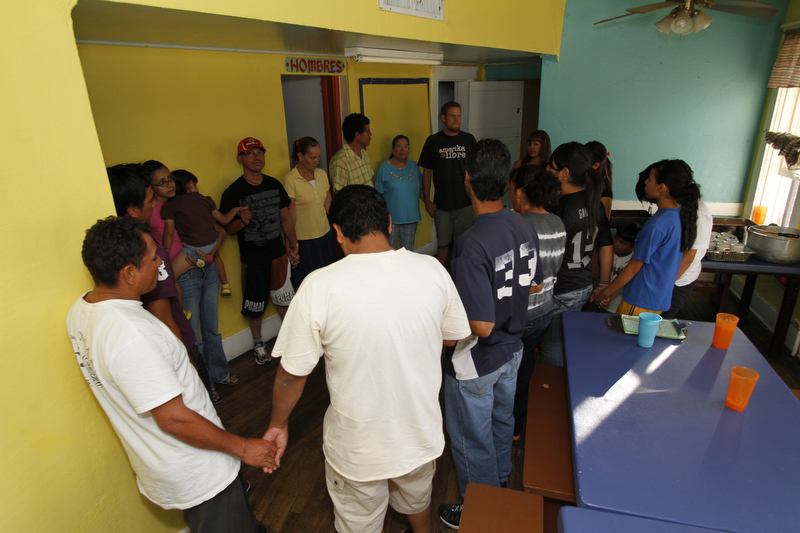
When referred to an agency, they would return to the house saying, They say they cannot help me because “no tengo papeles,” because “I have no papers.” There was no place where the undocumented could receive such basic services as food, shelter, clothing, and medical attention. In the El Paso community the undocumented were among the poorest and the most in need. And thus the decision was made that the undocumented would be the ones whom Annunciation House would primarily serve.
And so it was that little by little the volunteers were taught about who the poor were, about welcoming them and about serving them. With time the life and work of the house evolved, as did the volunteers themselves. Some left and new ones came. There has never been but a small number of volunteers living and working in the house at any given time. So also has the work never been but a tiny effort in the face of great numbers and tremendous needs.
There is always more left to be done at the end of the day than there was when it started. There is always a never-ending flow of guests to be welcomed and assisted. There is always a new opportunity to discover the meaning of Johns words, Little children, let us love in deed and in truth and not merely talk about it. There is always a never-ending opportunity to serve and meet Christ among the poor and to little by little experience the Gospel more deeply and try to live it more fully. (from https://annunciationhouse.org/)
Why we are we volunteering at A-House?
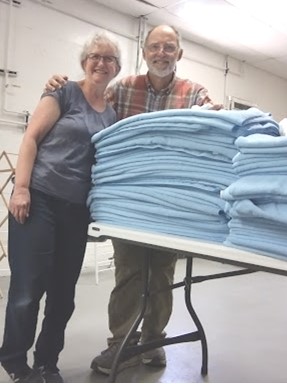
We have a historical and emotional connection to Annunciation House. Two of our daughters, Mary and Colleen, following their graduations from college (Mary in 2004, Colleen in 2014), spent 15 months living and serving at A-House. They each had profoundly enriching experiences that shaped their futures. Mary remained involved with A-House serving as a member of the advisory board and as a volunteer in-charge of volunteer applications. Colleen, a journalist major in college, has chosen to work professionally with non-profits that serve as advocates and trainers for low income workers employed as house-cleaners, yard workers, laborers, etc. Many of these are Spanish speaking migrants.
In 2021, when Covid broke out across the country, Mary reported to us that A-House was struggling recruiting volunteers. We immediately thought, since I could continue my counseling work over telehealth from El Paso, there was no reason why we could not volunteer. We spent three weeks at an A-house shelter mostly doing laundry, mopping floors, and emptying trash. We were able to meet with one of the A-House founders and director, Ruben Garcia (pictured) below.
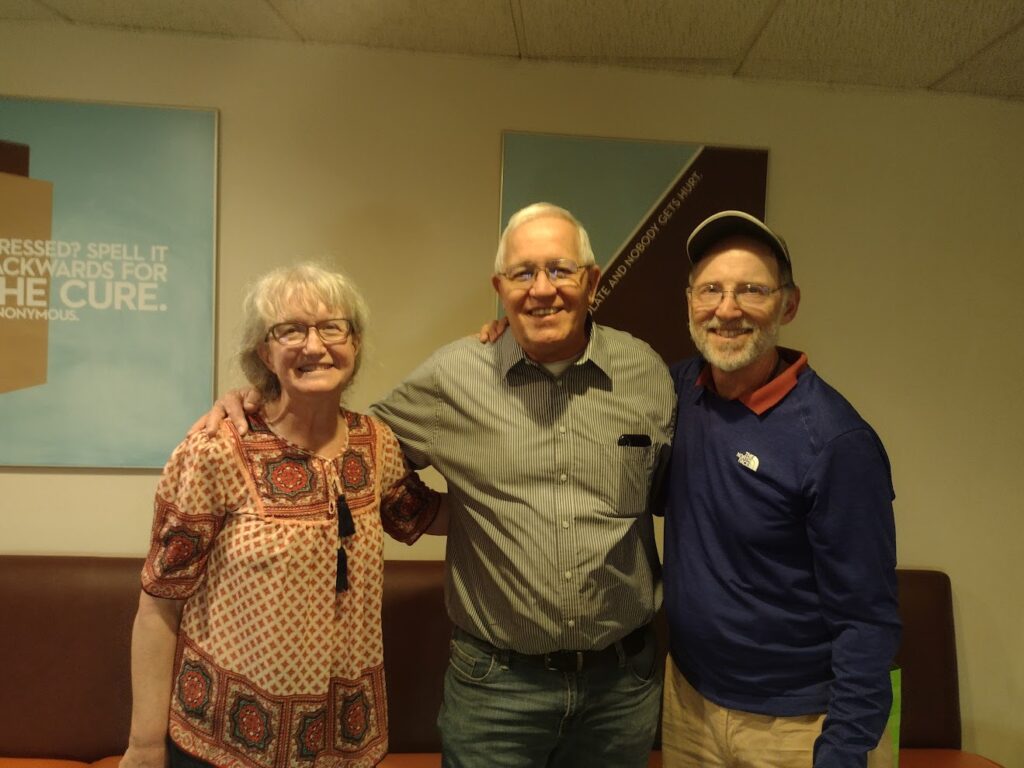
We are returning to A-House this summer for similar reasons. A-House is having a hard time recruiting volunteers because they are being scared off by:
Texas Attorney General Ken Paxton has sued Annunciation House, a nongovernmental organization (“NGO”), to revoke their registration to operate in Texas. The Office of the Attorney General (“OAG”) reviewed significant public record information strongly suggesting Annunciation House is engaged in legal violations such as facilitating illegal entry to the United States, alien harboring, human smuggling, and operating a stash house. (https://www.texasattorneygeneral.gov)
This is not true. Guests are brought to A-House by federal immigration officers who have processed the person’s asylum claim and given him/her paperwork allowing entry into the country until the claim can be heard at a future court date.
The Old Hound Dog, the Old Farmer, and the Risen Jesus
By Robert Fontana

There was once an old farmer talking with a young farmer about the coming harvest when they noticed an old hound dog chasing a rabbit into a thick grove of trees and bushes. The rabbit would run in and out of the thicket with the old hound dog hot on his trail. Soon other dogs, seeing the old hound dog chasing something, joined in the chase. They too went in and out of the thicket of trees and bushes, following the old hound dog who was following the rabbit. But after some time, the other dogs tired of the chase. One after another quit. The old hound dog, still catching glimpses of the rabbit at this turn and that, continued.
The young farmer mused out loud, “I wonder why those other dogs dropped out?”
The old farmer replied, “I guess they never saw the rabbit.”
As true for many mainline churches, the Catholic Church has a membership crisis. People, young and old, who have been raised Catholic, received the Sacraments, attended Catholic schools and/or some form of religious education, have left /are leaving the faith of their childhood. Many are leaving religion all together. They claim to be “spiritual but not religious.” Like the dogs in the story above, they never “saw” the rabbit, never encountered Jesus as truly alive and present, and never had the Holy Spirit stirred up in their hearts.
The reasons for this are many, but one primary reason is this: American culture offers an alluring vision for the good life that is simply contrary to the Gospel and hard to resist – play, pleasure, power, possessions, privilege, and position, all made possible by money. Fr. Richard Rohr calls these the “Poison P’s.”

What makes it very challenging to recognize how I am hooked into the “Poison P’s” is that they easily get embedded in the families, friendships, jobs, politics, entertainment, social media, etc. in which we participate. The Christian faith invites us to a disciplined life that is, in fact, a challenge to the “Poison P’s” rooted in American culture. As Christians, we are challenged…
- To use our privileges (e.g. education, good health, family upbringing, job opportunities, etc.) to reach out to the under-privileged.
- To live simply, minimize our possessions, and care for the earth and its resources.
- To wait until marriage to be sexually intimate (and to remain celibate if one is unmarried).
- To use our power to act justly towards one another and be a power for good in all circumstances.
- To welcome the stranger and the immigrant.
- To care for the elderly, the sick, and those with physical, mental, emotional challenges.
- To love one’s enemies and pray for one’s persecutors.
- To be faithful in marriage and open to welcoming children into the world.
- To forgive all who have hurt us.
- To be quick to listen, slow to speak, and slow to anger.
- And most importantly, to find our fundamental identity as persons not in what we do or possess, but in our relationship to God as God’s precious children.
It is the living relationship with God that enables a person to step into the modern world of the “Poison P’s” and reorganize them so that being a disciple of Jesus and following the lead of the Holy Spirit transforms how we play, seek pleasure, enjoy privilege, obtain possessions, and use power.
When I have “seen the rabbit,” and I’m not just one of the other dogs chasing a dog for the fun of it,” then I will be motivated to “stay in the chase.” When I know God’s love deeply and personally, when I can feel the risen Jesus close to me, and when I am filled with the joy of the Holy Spirit, then I am ready to begin the spiritual journey as God’s beloved daughter or son by:
1. Inviting Jesus to shape my character.
2. Asking Jesus to show me God’s will for my life.
3. Asking Jesus to show me the specific gifts of the Holy Spirit given to me to be a power for good in the world.
Besides the allurement of the world’s “Poison P’s,” there are other reasons why people young and old are leaving the Catholic Church. For some the Church is too liberal, with too much focus on social justice issues. For others, it’s too conservative, with too much rigidity around the sacraments or sexual issues. And for others, it’s the criminal and sinful behavior of Catholic leaders involved in clergy sex abuse and cover-up. These issues need to be addressed. However, in my opinion, the greatest need we have is to find effective ways to help one another, especially our youth and children, encounter God and embrace a life-giving relationship with Jesus through the Holy Spirit. Having just celebrated the great Church feast of Pentecost, let’s remember to pray to the Holy Spirit for strength, guidance, and wisdom to help us move forward together as a faith community.

Photo 24356482 © Sabphoto | Dreamstime.com
Marriage is a foretaste of heaven (or hell)
By Robert Fontana

The Scriptures are clear: heaven begins this side of heaven. Paul writes, “So whoever is in Christ is a new creation: the old things have passed away; behold, new things have come.” (2 Cor 5:17) John writes, “See what love the Father has bestowed on us that we may be called the children of God. Yet so we are.” (1 John 3:1)
This is not simply meant as a theological truth while we toil in this “valley of tears.” We should experience the fruits of being a “New Creation,” a “Child of God” this side of heaven, through how we love one another. This is especially true for couples who marry in Christ Jesus. As a pattern, Christian married life ought to bring us “love, joy, peace, patience, kindness, generosity, faithfulness, gentleness, self-control.” (Gal 5:22-23)
Sadly, for too many Christian couples, marriage is a foretaste of hell rather than heaven. The current data on divorce rates among Christian couples is 28% for Catholics, 33% for Protestants. UGH! Furthermore, from my experience as a marriage therapist, many long-term Christian marriages are unhappy.

There are a variety of reasons for this, but a primary one is that couples do not work on their marriage. By not giving their marriage attention, couples begin to take one another for granted, other things become more important, and couples grow apart. They may go to Church and look like the “Holy Family” on the outside, but on the inside, they are lonely, hurt, and disillusioned. This does not have to be. There is a solution!
Work on your marriage!
It’s not just working on learning better communication skills, doing relationship inventories, reading self-improvement books, and going on retreats – although these are all good and important. Working on your marriage especially involves maintaining friendship and having fun together. Marital friendship, according to the research, is the key ingredient to sustaining happiness in love over a lifetime.
Marital friendship means turning to one another as the primary person to give and receive affection, trust and openness, fun, admiration, sexual intimacy, acceptance, and, of course, forgiveness. With marital friendship fosters a “holy communion” between spouses with the fruits of the Holy Spirit being present as a pattern in the couple’s life: love, joy, peace, forbearance, kindness, goodness, faithfulness, gentleness and self-control. (Gal 5:22-23) Now wouldn’t that be a taste of heaven before heaven?
Work on your marriage and your marriage will work! If you need help, attend a workshop or retreat together. Lori and I are presenting a retreat for couples at the Bon Secours Conference Center, Marriottsville, Maryland. (Details are below; join us if you can!) There are many good workbooks for couples. A favorite of mine is John Gottman’s The Seven Principles for Making Marriage work. Lori and I also have a workbook for couples that you might consider using. It’s called “Hidden Treasure: Discover the Amazing Gift of Your Marriage.” You can get it on Amazon or Barnes and Nobles.
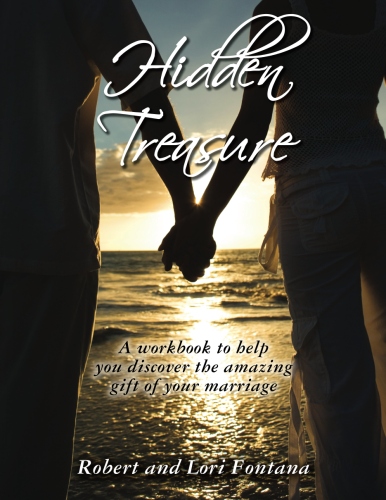
Of course, if you are really in conflict, go to couples counseling. I’m seeing couples who are preparing for marriage, recently married, married for a dozen years, and married for over 30 or 40 years. Conflict that turns into fighting happens at all stages of married life. Do not hesitate to get help if you are stuck in a rut and are unhappy in your marriage regardless of how short or long you have been married. God and a good marriage therapist can help bring joy back to your marriage.
Christian Marriage Is Beautiful…and Hard
Friday, August 23 (4 pm) – Sunday, August 25 (11:30 am) at the Bon Secours Retreat and Conference Center, Marriottsville, MD
Join us for a marriage/relationship enrichment retreat for all marriages and committed couple relationships: those strong or struggling; recently married or married for years; divorced and remarried with blended families; and couples who are not married but want relationship help. This retreat is guided by Robert & Lori Fontana.
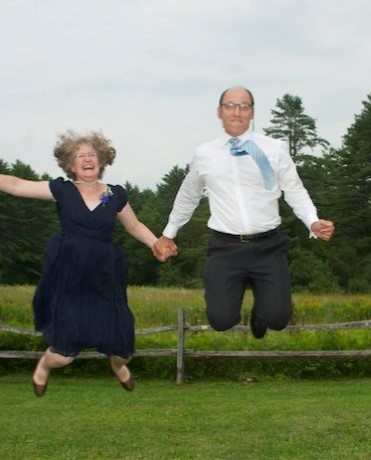
Presentations will include a mixture of prayer and reflection, music, skits, stories, and excellent information based on Scripture, Catholic teaching, and clinical experience. You will reflect on the beauty of Christian marriage, the social evidence on why it is hard to live out, and the ingredients of a successful marriage. This is a participatory retreat with opportunities during each session for spouses/partners to separately complete relationship inventories related to the topic, share their answers with each other, and dialogue. You may gain new skills in self-awareness, communication, and conflict resolution or strengthen these skills that you already have.
The price of $500 is per couple. Please place both names within the name field (i.e First Name: John&Jane, Last Name: Doe/Smith). For single rooms or commuter options, please email Doris.Gallagher@BonSecoursRCC.org.
Check-in begins at 4pm and an orientation session will be held at 5:30pm. Mass will be available on Sunday. Please note that lunch is not included on Sunday before departure.
To register: https://bonsecoursrcc.org/event/christian-marriage-is-beautifuland-hard
A Resurrection Story: “My life was a living hell surrounded by the walking dead.”
By a friend of the Fontanas who wishes to remain anonymous
I’d like to briefly share my struggles with drug addiction and the road that led to my recovery in the hope of inspiring anyone who may be struggling or knows someone who is struggling.

I am middle age and a software engineer by trade. My childhood was a tale of two cities. On one hand, I was blessed to belong to a very large, supportive, and loving extended family. But on the other hand, at home, in a low-income neighborhood, my immediate family was very dysfunctional. My mom and biological father separated when I was a baby. My mom remarried and my stepdad became my dad. My parents divorced when I was 5 years old, and my siblings and I were left living with our single mother who struggled financially with a minimum wage job and four young kids to support. She then married a physically and emotionally abusive man, got hooked on cocaine and crack. From there our home life was filled with chaos, violence, and pain. Mom died from a drug overdose when I was 13 years old.
After she died, my siblings and I went to live with our father who had remarried a woman who drove a wedge between him and our family. I wasn’t fond of her, and began to act out. I was putting a strain on his marriage, so he told me it was best that I leave. I called up my grandparents and moved out at 16. He and I are still estranged to this day.
I started to smoke pot. My weed use led me though different social circles, where eventually I met a girlfriend who introduced me to meth. I immediately loved the euphoric feeling it gave me. It suppressed all negative emotions and only amplified positive ones. There were no more feelings of worthlessness and self-loathing. This revelation then inspired me to try anything and everything else I could get my hands on; crack, cocaine, heroin, LSD, mushrooms – you name it, I consumed it in abundance. My late teens and 20s were a complete blur, oscillating between addiction and sobriety, my grandma’s house and slapdash living arrangements, unemployment and various odd jobs like a delivery driver, auto mechanic, and bus boy.
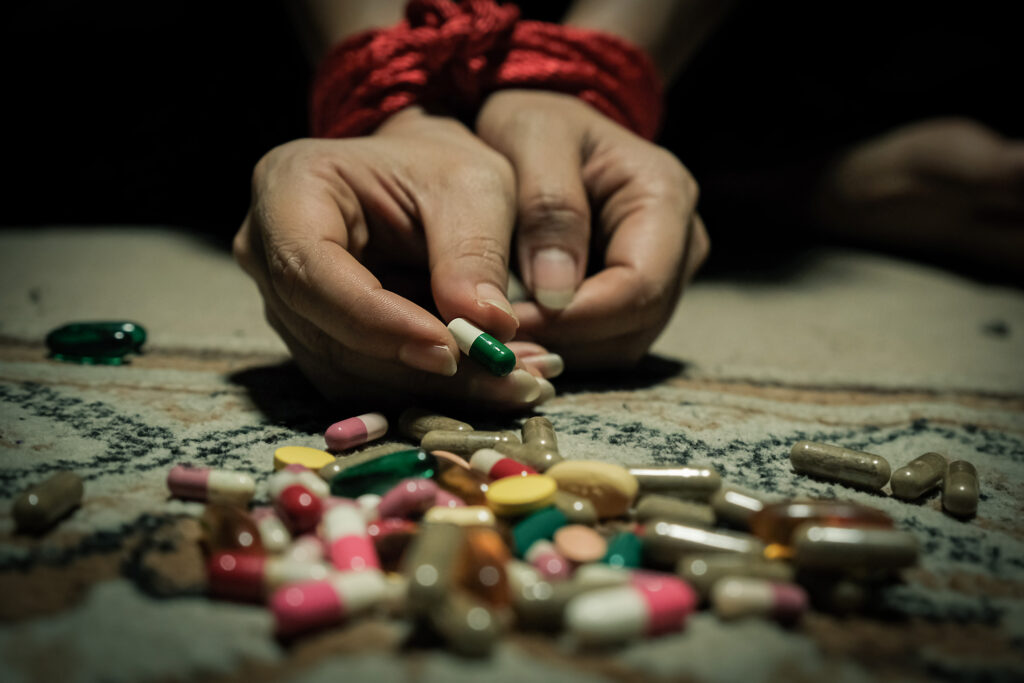
Miraculously, during one of my sober stretches (imposed by a very bad DUI conviction), I graduated from the university with a degree in mathematics. Shortly thereafter, I landed my first professional job as a business intelligence developer. I was dating someone again, but a week before my first day at the company, the perfect storm happened. My girlfriend and I broke up, and while in despair I bumped into an old acquaintance with whom I used to do drugs, and we smoked some meth. From that day forward, every day for the next 5 years, I was a full-blown meth addict.
For a while I was a high functioning meth addict. I would crush it up and mix it with some juice or coffee that I’d keep at my desk and just sip all day long. I used it every day – before work, during work and after. While everyone around me was moving forward in life, getting married, having kids, getting promoted, going places – I was content just standing still, hunched over a computer screen in a corner, getting high and writing software. At the end of the day when all my colleagues returned home to their families, I returned to a drug den to get high with very bad people. I was under the illusion that they were the people I belonged with, the unwanted, the outcast. That’s the narrative I force-fed myself, and eventually believed.
This went on for 3 years. A day came when I was barely functioning at all. I would go days without sleep and show up to the office with pupils so dilated my eyes were black, barely able to string together complete sentences. My personal hygiene had gone down the drain, not showering or washing my clothes. I started to skip important meetings with executives, missed critical presentations, and disregarded important deadlines. And my attendance started to slip.
During all this time, my manager, who was a very empathetic person, had tried his best to reach out to me, as he obviously sensed something was profoundly wrong. He repeatedly made efforts to help me – vacation time to rest, flexible scheduling, new projects to work on. But it finally came to the point when one day he took me into his office and gently fired me.
My addiction had fully metastasized and taken over my life. I hung out at dope spots, getting high and going nowhere. Within 6 months I was completely broke. I had burned through my savings and was 80k dollars in debt from maxed out credit cards. My car was repossessed. I was borrowing money from as many people as possible and not paying them back, burning bridges left and right, flaking out on anyone who still bothered to be in my life. I had reached a point of total desperation, as I had an insatiable drug addiction, and no money to buy drugs. The only vestige of stability left in my life was living at my grandmother’s house, but I managed to screw that up too when I stole from her to buy drugs and was kicked out onto the streets.
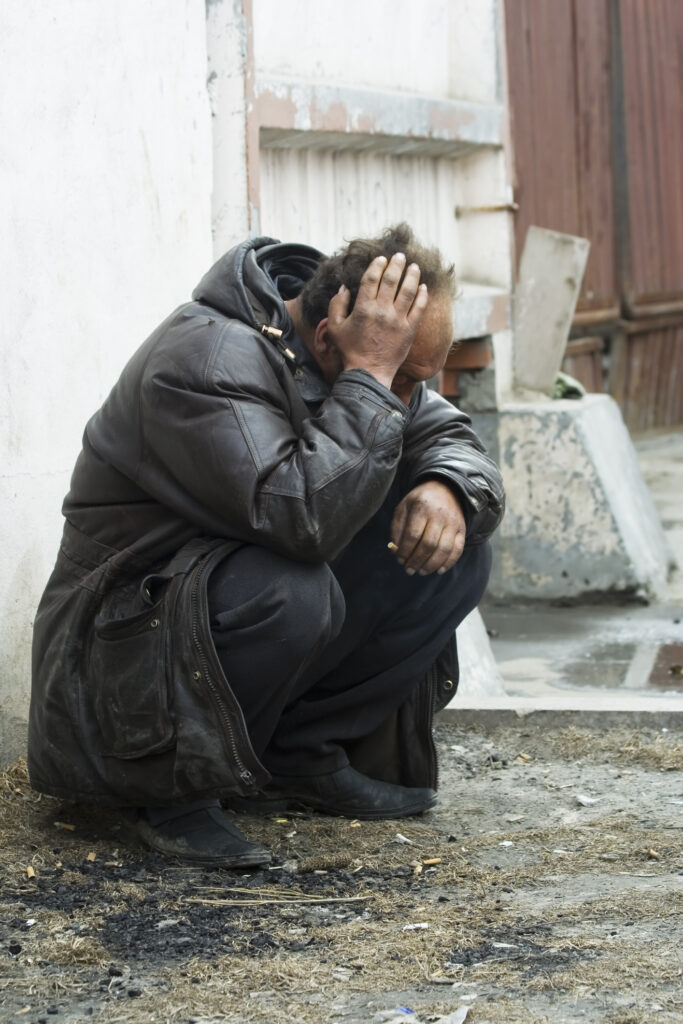
My life was a living hell surrounded by the walking dead. I was homeless for an entire year and ran around with addicts, dealers, felons, thieves, and convicted murderers. I slept in green belts, gutted RVs, backyards, front yards, cars, tents. I did whatever I could to get dope. I had multiple encounters with the police. I knew people who died from gun violence, suicide, and fentanyl overdose. My entire life revolved around one sole purpose which was to acquire meth.
For a while I had accepted my fate because I truly believed I possessed no inherent value as a human. In a way it was all a penance, a restitution for being unworthy of love, and for bringing shame upon my family. But from time to time, I would reach out to certain family members with a borrowed cell phone just to maintain a tether to the land of the living. Sometimes I’d talk to my brother, other times my cousin. Late one night as I was walking aimlessly through the streets, I had the epiphany that I had hit rock bottom, and it wouldn’t be long before I was either in jail or dead. I realized I wanted to live and so the next day I called my cousin, and he helped set up an intervention with my extended family. This intervention included my biological father who was a big part of my recovery.
After the intervention, my family generously put their money together and sent me to Mexico to receive an experimental treatment known as Ibogaine, which is one of the world’s most powerful hallucinogens, derived from a tree bark indigenous to Africa. It’s an intense therapy where you are administered a large dose and then monitored by nurses in a controlled hospital setting as you hallucinate for 24 hours straight. It was one of the most terrifying experiences of my life. At first, I relived the most painful events of my life, but later in the trip the fear slowly faded away into acceptance, forgiveness, and finally a deep peace that I’ve carried with me to this day. Ibogaine was nothing short of a miracle drug for me. I’m happy to see that its applications to not only addiction, but also depression and PTSD, are becoming more well known.
When I returned to my family my lovely aunt and uncle graciously allowed me to stay with them. They housed me, fed me, helped set up outpatient treatment, treated me like their own child. After 4 months there, I moved into a halfway house where I lived with other recovering addicts, gradually easing my way into independent responsible living. Within 2 months I landed a job as a data engineer and had my own apartment.
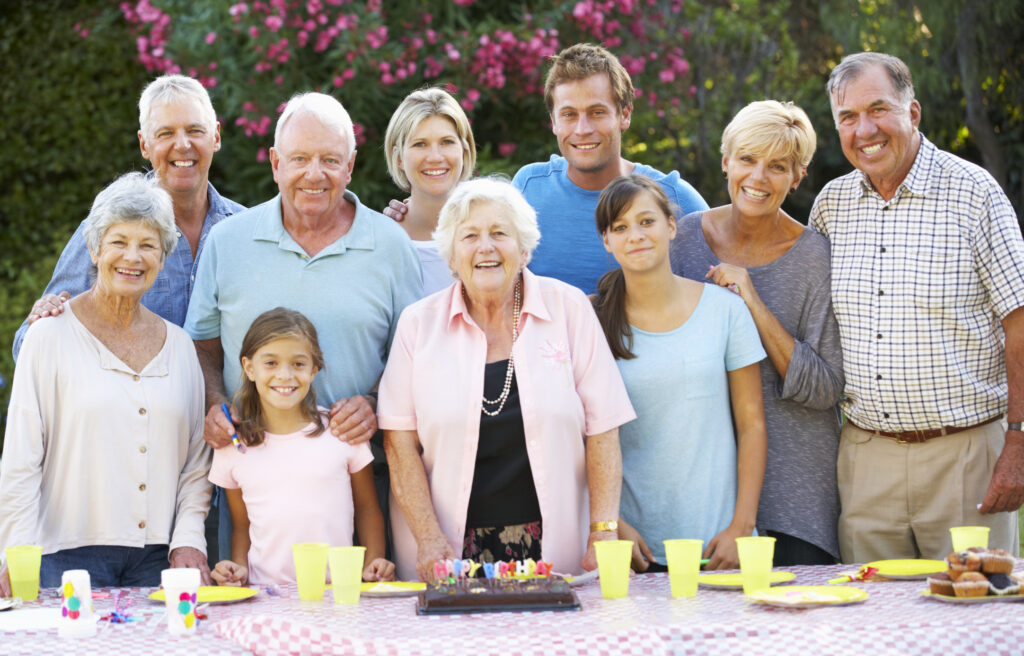
Fast forward 8 years and I am still sober. I’ve paid off 100k in debt, got another car, gone through numerous promotions at work, and recently bought a house. I was able to reconnect with one of the guys I knew on the streets and started sponsoring him. He’s been sober for 3 years now and has completely transformed his life. Most importantly, I repaired my familial relationships, including my grandmother whose heart I once broke.
It’s a wonderful feeling to be loved by so many people. Rather than having 2 parents, it’s like I have dozens, which is pretty special. In the end I realized that love is the one redemptive force in the world, and family is its purest form. From love extends all good things in life: forgiveness, redemption, peace, sobriety. All it takes is for one person to love someone else, to show that person they are worthy of love and in doing so, perhaps most importantly, teach that person to love themself. Luckily for myself, I had dozens of beautiful people to teach me: brothers, sisters, cousins, aunts and uncles, grandparents, nieces and nephews.
I am also especially grateful for my siblings, who, having gone through the same painful experiences I had, were much stronger than I, and managed to process and overcome their pain without succumbing to the pitfalls that befell me. Their strength is an inspiration to me.
Thanks for taking the time to read this.
God Bless.
